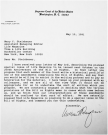What the Declaration Doesn't Say
This July 4, like countless prior, will witness paeans to the Declaration of Independence, celebration of its unalienable rights, laments of their demise amid spreading statism and the shrinking space left for the individual in American civic life—all of which might be compelling if the Declaration said any such thing. A more suitable tribute on the document’s 237th birthday would be to recover its actual meaning and proper context. (That context, I should indicate before proceeding further, I learned from George W. Carey, to whom the bulk of the ensuing insights—like most of those I claim for myself—are hereby attributed.)
The typical understanding of the Declaration’s unalienable rights is that they are the immutable and unregulable property of the individual, who is thereby rendered immune from the jurisdiction of the community with respect to his or her life, liberty and pursuit of happiness. But a moment’s inspection renders this individualist understanding absurd. Life, liberty and happiness are obviously regulable and necessarily alienable. No grownup seriously believes he or she has the liberty to do whatever, whenever he or she pleases while occupying political society with other adults. Meanwhile, to alienate, in lawyers’ parlance—and such was Jefferson’s profession, so it is safe to assume he knew of what he wrote—means to surrender in exchange for an equivalent. On the Lockean bargain implicit in the rhetorical structure of the Declaration’s preamble, the very basis of civil society is the surrender of natural rights to life, liberty and property in exchange for political equivalents—i.e., their alienation. If these unalienable rights are held by individuals, the preamble is reduced to nonsense. If, by contrast, they are held by the American people vis-à-vis the British, its logic is clear.
But if they are held by the people, presumably those boundaries all grownups can perceive are regulable by the people too. This is plain if, contra the practice of most civic educators in America, we actually read the entire document rather than simply the rhetorical stanzas with which it opens. The bulk of the complaints against King George—this is generally shunted aside as the boring stuff, but it is actually where the Declaration gets most interesting—accuse him not of violating the rights of individuals but of impeding corporate self-government. He imposes taxes “without our Consent”; maintains standing armies “without the Consent of our legislatures”; “suspend[s] our own legislatures”; and so on.
The Declaration, in other words, does not guarantee individual rights as reservations from the jurisdiction of the community. It is meant to secure the community’s capacity to govern itself. This is what makes it ultimately compatible with the Constitution, which some commentators have wrongly seen as a derailment from the high-toned themes of the Declaration.
In either case, the Declaration must be properly contextualized. It is a founding document but not a framing document, which is to say it does not have legal standing in the same way the Constitution does. When Justice Brennan, for example, grounded his activist jurisprudence partly in the ideals of the Declaration, he imported a document into constitutional law that simply has no place there. But this is not a liberal trope alone. As Ralph Rossum has shown, the Declaration plays a prominent role in Justice Thomas’ jurisprudence as well: the Constitution, in his understanding, was meant to fulfill the aspirations of the Declaration.
The ensuing temptation, depending on whether one views the Declaration from the right or left, is to read guarantees of either equality or individual rights into the Constitution that, like it or not, are not there. Both forces—egalitarianism and individualism—corrode political community, fueled in part by the casual, almost lazy manner in which the Declaration is rhetorically invoked. This July 4 would be a fitting time to celebrate the document by starting to grapple with its meaning more seriously.
